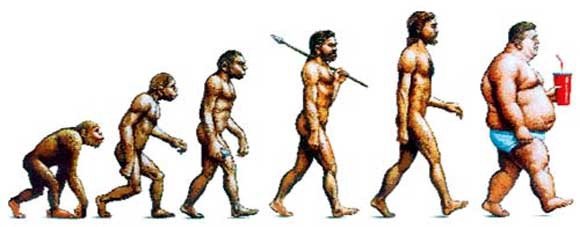
Over a period of several million years, we evolved from the ape on the left to the strong, upright, intelligent human second from the right. We did so because our ancestors ate a diet of animal meat and fat. When the 'experts' told us to eat a high-carbohydrate, low-fat diet, starting in 1983, it took mere decades to turn us into the obese, metabolically-damaged person on the right. Now the 'experts' want us to cut back on meat. Let's not be fooled again.
We are frequently told to 'eat less meat' for the good of our health and for the good of the planet. Both these ideas are completely wrong. This dogma is not promoted for our health but for the wealth of global food corporations that are intent on making huge profits from their processed food. When you and I buy meat from our local butcher and the butcher bought it from a local farmer, there is nowhere in that process for global companies to make money, which is why they don't like it. The idea that ruminant animals, like cows and sheep, have caused the recent surge in green houses gases is absurd and information on this site will prove that these animals, when properly managed, are essential for food security, soil fertility and carbon sequestration.

This picture is part of a series of cave paintings from Lascaux in France. It is thought to be 17,000 years old. It is typical of many ancient cave paintings from around the world. It clearly represents the large animals our ancestors hunted for food. There are no known examples of cave paintings dedicated to plant food. Our uneducated, ancient forebears were far more in tune with their dietary needs than the nutritional experts of today.
We evolved because we ate meat
The natural world thrives on balance. Plants grow on the land; herbivores eat the plants; carnivores eat the herbivores. This process maintains equilibrium. Humans have relatively large brains and small intestines and, because the brain requires so much energy, we must have evolved by eating highly nutritious, easily digestible foods. Animal proteins and fats are the only foods with sufficient energy and nutrient density to facilitate our evolution into the dominant species on the planet. We have a highly developed brain because our ancestors ate animals for over a million years.
The Inuit don't eat plants
The Arctic Explorer, VilhJalmur Stefannson, lived with the Inuit in the Arctic Circle for several years and ate their diet of fish, seal, whale and blubber. He says he had never previously felt so healthy. His definition of a 'balanced diet' is miles away from the ideas promoted by a modern nutritionist. He says you have to eat animal fat with lean meat to have balance.
When he returned to New York, he and his co-explorers lived on nothing but meat, and fat, for two years. This experiment was supervised by researchers who could find no health problems in these men throughout that time.
What about the link between red meat and cancer?
A study was published in April 2019, claiming that eating red and processed meat, on a regular basis, increased our chance of colon cancer by 20%. It was reported in every newspaper and on television news. Unfortunately for us all, journalists have not properly investigated these claims: they just printed them because they create dramatic headlines. On this website, these claims will be examined closely.
1. The research was an observational study using food frequency questionnaires. This type of study cannot prove cause and effect; it can only highlight an association. We need a controlled trial to prove one thing causes another. So there is no proof here.
2. Food frequency questionnaires are notoriously unreliable and the one used in this study was particularly bad. The question about eating beef included steak, mince, beef curry and beef burgers. There is a huge difference between eating a steak with fresh vegetables and eating a burger with a bun, potatoes fried in reheated vegetable oil, washed down with a large sugar-laden fizzy drink. The questionnaire did not differentiate, which means that the tiny increase in observed cancer could have been caused entirely by the ultra-processed junk food some people were eating with their burgers.
3. The 20% increased risk figure is a typical piece of misleading manipulation; it is relative risk rather than absolute risk. Among the people who ate red meat most frequently during the six years of this study, 0.6% developed colon cancer. In the people who ate the least meat 0.5% got colon cancer. The difference between 5 and 6 is the relative risk of 20% but the actual increase in risk is 0.1%. The thing to remember is that 994 out of every 1,000 people eating the most meat did NOT get cancer.
4. None of the newspapers reported that among the women, who were eating the most meat, there was absolutely no increase in cancer rates.
5. One of the three authors of this study is a registered member of the Vegan Society. This does not prevent him from conducting good science but it is a huge conflict of interest, which makes me even more suspicious of the conclusions.
6. The advice to cut back on eating meat in response to such a tiny and unreliable risk of developing one particular cancer is unjustified. It also ignores the huge range of benefits that eating meat and other animal foods provide for our physical and mental health. This website will provide the knowledge we all need to see through the vegan propaganda that threatens our health, our traditions and the livelihoods of our farmers.